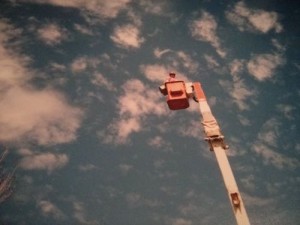September 16, 2015
A ride in the bucket
 I’m something of a pathological truth-teller, which is a line I stole from Lauren Groff’s new novel, Fates and Furies, the book I’m reading right now. The interesting thing about that line being that the character described has a more ambiguous relationship to truth than the speaker supposes. Which is always the way. Truth is fudgy. I think I only have such a strong affinity for the principles of truth because lies are so easy, the slipperiest slope—and then anything one says ceases to have meaning, and then what is the point?
I’m something of a pathological truth-teller, which is a line I stole from Lauren Groff’s new novel, Fates and Furies, the book I’m reading right now. The interesting thing about that line being that the character described has a more ambiguous relationship to truth than the speaker supposes. Which is always the way. Truth is fudgy. I think I only have such a strong affinity for the principles of truth because lies are so easy, the slipperiest slope—and then anything one says ceases to have meaning, and then what is the point?
It’s true though I’m often willing to forsake a bit of truth for the sake of a story. Which is why I wouldn’t be surprised at all to have made up the whole thing, the story of my friend Britt and I driving down a country road outside Peterborough during the summer of 2000. How there was a hydro truck pulled over by the same of the road, a crew working on a Sunday. (At the time, I don’t think I knew the song, “Wichita Lineman”, or else I would have been humming it.) We pulled up alongside, and somehow had the nerve to roll down our window.
“Could we have a ride in your bucket?” I asked.
And I’ll never forget the so-perfect response: “I can’t think of a reason why not,” the crewman said.
And he even meant it.
And so the crewmen paused their work for a moment and gave us each a chance to put on a hardhat and take a trip up in the bucket. Violating more health and safety policies than I can dream up, though I was 21 at the time and didn’t think in those terms. Still though, we knew it was amazing. We took pictures. That vivid blue sky, the wispy clouds.
If not for the photo, I really wouldn’t believe it. I’m not even sure I really remember it happened. That ride in the bucket seems more like a figment. A figment of reality, if there exists such a thing. “I can’t think of a reason why not,” that crewman said—has there ever been anybody else with so limited an imagination? And yet. Perhaps he was dealing with a surfeit, head in the clouds literally and otherwise.
And I mention this story here now because for the past few weeks, I’ve been stuck in the past, working on a story whose roots are autobiographical. All this spurred on by my husband’s application for Canadian citizenship, and how I was rooting around in boxes to unearth his university degree (which confirms his competency in English). I found my diary from my final year of university, a diary that begins on September 14 2001 and is written by a girl who was dazzled and devastated by the world at once. And I found the scrapbooks I so painstakingly compiled back in those years, determined to preserve every single moment. Not yet understanding then that there are so many moments, if we’re lucky, more moments than ever could fit in a storage locker full of scrapbooks. Not understanding then either that I mightn’t want to hold onto everything forever. That there would be so much I’d want to let go.
When we moved back to Canada ten years ago, I got rid of a whole bunch of stuff. Diaries, scrapbooks, yearbooks, tossed out in black plastic bin bags. There wasn’t room for all of it. Who wants to go through life with so much baggage? But I didn’t get rid of all of it. Enough to fill a couple of boxes, from the years that were most monumental. So there would be gaps, big gaps, but I don’t regret it now. I don’t regret the bits I kept either, which become more and more precious all the time. But so too are the gaps, which allow me tremendous freedom both as a writer and as a human being. To let stuff go, to be allowed to forget, but also to fill those gaps with other things—creation.
To go for a ride in the bucket, I mean, whether it happened or not.
- If Creative Nonfiction is your thing, check out Amanda Leduc’s series this month on The Puritan’s Blog. She writes about Lucy Grealy and chutzpah, see Julia Zarankin on birdwatching and the pursuit of the strange, and Liz Harmer on writing without rules.






Great post, Kerry. Truth is indeed ‘fudgy’!
Thank you, Mark!